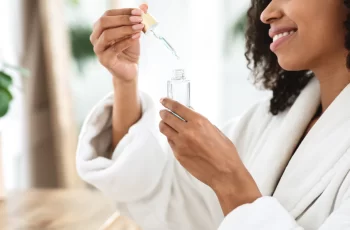
Can Copper Peptides Replace Retinol?
When it comes to using retinol in your skincare, you’ll be hard pressed to find another ingredient that is able to deliver the same level of results. Having said that, copper peptides have gained a reputation for several decades for their skin restoring benefits. It’s not been until recent years that the similarities between copper peptides and retinol have been noticed.
The main question today is, can copper peptides replace retinol? Let’s dive in and find out more about both these powerhouse ingredients and hopefully clear a few things up!
Can copper peptides replace retinol?
Yes, they can! Copper peptides are tripeptides which means they are short chains of amino acids. This makes them essential for maintaining the overall skin structure by boosting the production of collagen and elastin. They are also packed with antioxidants and anti-inflammatory copper peptides are an overall remarkable ingredient that provide many benefits.
You will also find that they do not exfoliate the skin, but instead work in a similar way to retinol by increasing the skin cell turnover resulting in an all over fresh, healthy, and glowing complexion. The main difference you’ll find is that they don’t have the same level of skin irritation as retinol, which is one of the common side effects you experience when you first introduce retinol into your skincare routine.
Which is better copper peptides or retinol?
The jury is still out on this debate, with many favouring copper peptides and others retinol. With both ingredients providing similar benefits for the skin, you’ll often find many prefer to use copper peptides and retinol together in their routine.
One of the main factors that help people determine which ingredient to use is the fact that unlike retinol, copper peptides are unable to improve the texture of the skin. If you are wanting to improve the smoothness of your skin, reduce the pigmentation of dark spots and hyperpigmentation then retinol is the ingredient for you. Another factor to consider is the fact that copper peptides are generally considered quite an expensive ingredient, resulting in the formulas they are blended in to come with a large price tag.
Skincare benefits of copper peptides
Soothe and calm irritation to the skin with anti-inflammatory properties
Promote the production of elastin and collagen in the lower layers of the skin
Helps to speed up the recovery of surface wounds and heal scars
Increase the speed of the natural skin cell cycle, revealing fresh, healthy skin cells
Skincare benefits of retinol
Reduce the signs of premature ageing, such as fine lines, wrinkles, and loss of elasticity
Fades the pigmentation of dark spots and areas of hyperpigmentation
Speeds up the natural skin cell cycle revealing newer, brighter skin
Improves the overall skin texture making it appear smoother
There you have some examples of the main benefits of retinol and copper peptides. Deciding on which is better really boils down to you and your skin type. If you ever have any questions, there are a variety of skincare and medical experts that would clear up some of the confusion. I would also suggest you perform a patch test for 24 hours before applying any new product formulations on the skin.
Can copper peptides be used with retinoids?
Yes, they can, but with caution, I would advise you to alternate their application to different evenings throughout the week. You can also opt for applying copper peptides in the morning, following your night-time routine with a retinol enriched product. The only problem you may encounter with this is the fact that this potent duo can be too harsh on the skin surface. To avoid this its best to consult with a doctor or dermatologist to ensure you are using your products correctly.
Are peptides as effective as retinol?
Yes and no, this really depends on the needs you have and areas of concern you are wanting to target. There’s no denying that retinol is one skin ingredient that can have quite the impact on your skin. Peptides however are far less aggressive on the skin and provide anti-ageing results from making the skin feel firmer and fine lines being smoothed out. It’s no wonder that many beauty brands are making the decision to include copper peptides in their formulas instead of retinol.
The bonus of peptides in formulations is the fact that those with a sensitive skin have the opportunity to experience similar benefits as retinol. Something they would have missed out on previously due to the potent vitamin A being too harsh on the skin. Peptides are easily tolerated by other ingredients and so including them into your daily routine is a much simpler task, this probably explains why many are making the switch from retinol enriched products to those containing peptides.
How often should I use copper peptides?
You can use copper peptides twice a day in your skincare routine. Although they deliver a few effective skin results single handily, many skincare experts suggest you use them in conjunction with other formulas, such as moisturisers and hydrating serums, especially if they are enriched in ingredients such as hyaluronic acid. When teaming this cocktail of ingredients together you are strengthening the protective skin barrier, ensuring it is able to combat any exposure to free radical damage.
What goes on first peptides or retinol?
If you are wanting the best out this collagen boosting skin duo many opt to team them together during their evening routine. First you should apply your retinol product and allow 30 minutes for it to absorb into the skin. This will also ensure the pH levels of the skin will become balanced and prepared for the application of your peptide enriched moisturiser. By using retinol first and following it with peptides you’ll find the skin is able to combat signs of ageing and uneven skin tone without the severe dryness often caused by retinol because of the calming properties of copper peptides. Don’t forget to follow this in the morning with an SPF of 30 and above to keep the skin protected.
There you have it, hopefully you now have a better understanding of copper peptides and whether they can replace retinol. Don’t forget you can find out more over on our Instagram, so come and give us a follow!


